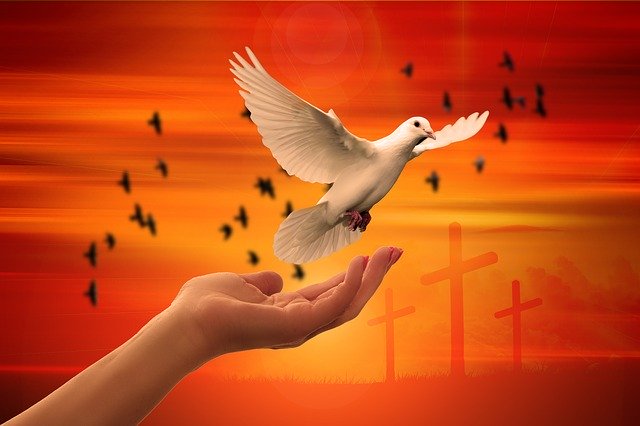 During this time of international crisis, it’s very tempting to employ Eastern meditation techniques such as mindfulness meditation in order to escape our anxiety. But if we want the kind of peace that will carry us through this pandemic and beyond, we need to build it upon the right foundation.
During this time of international crisis, it’s very tempting to employ Eastern meditation techniques such as mindfulness meditation in order to escape our anxiety. But if we want the kind of peace that will carry us through this pandemic and beyond, we need to build it upon the right foundation.In this brilliant article by theologian Peter Kwasniewski, he reflects upon the writings of St. John Paul II to compare the Christian and Buddhist mystical traditions to reveal the strikingly difference between the two.
For example, the Buddhist idea of liberation from evil involves the use of ascetism and detachment to break one’s ties with external reality, including human nature, in order to acquire freedom from suffering. As St. John Paul II explains, this practice might seem very similar to what Christians do except for one very important difference – the Buddhist form of liberation rests on an atheistic foundation and the Christsian version is built upon salvation.
“John Paul II contrasts the abysmal emptiness of the Buddhist path with the fullness of light and life promised by Christ to those who deny themselves for His sake ― for the sake of finding themselves anew in Him,” Kwasniewski writes.
Referencing one of his favorite writers, St. John of the Cross, John Paul goes on to speak about the need for detachment and purification of the senses, but not as an end in itself as it is in Buddhism.
“…[T]his Doctor of the Church does not merely propose detachment from the world. He proposes detachment from the world in order to unite oneself to that which is outside of the world―by this I do not mean nirvana, but a personal God. Union with Him comes about not only through purification, but through love,” Kwasniewski explains.
For this reason, “Carmelite mysticism begins at the point where the reflections of Buddha end,” John Paul wrote. “…[D]espite similar aspects, there is a fundamental difference. Christian mysticism from every period... is not born of a purely negative ‘enlightenment.’ It is not born of an awareness of the evil which exists in man’s attachment to the world through the senses, the intellect, and the spirit. Instead, Christian mysticism is born of the Revelation of the living God. This God opens Himself to union with man, arousing in him the capacity to be united with Him..."
In other words, “Christian asceticism is about detachment from selfishness for the sake of being all the more attached in love to the beloved,” Kwasniewski explains. “We need to be detached because, as beings who thrive on attachments, we need to make sure we are rightly attached to the right things, not because we are better off isolated and indifferent.”
As a result, the contrast between Buddhist “salvation” and Christian salvation could not be more striking. In Truth and Tolerance, Joseph Ratzinger contrasted the vast difference between Buddhist “salvation” and Christian “salvation,” between “where the ego is lost in an ocean of impersonal ‘divinity,’ and the path of personal communion where the self, through a process of abandonment and purification, becomes for the first time really and truly itself, precisely by surrendering to and being caught up in the Beloved," Kwasniewsk continues.
We truly find ourselves only when we lose ourselves in the One who created us, a truth based on the truth that “Man was made by God for God, not by the cosmos for the cosmos. Here is where the Christian faith is unique and superior: we find rest in a person, in a friendship founded on a love that knows no limits and will last forever.”
Today, we might be looking for peace amidst the pandemic, but when this crisis is over, and the typical anxieties of life come back, we'll want to maintain our peace. The only way to do this is build our peace upon a foundation that will last.
How do we do this? In our webinar, Beyond Mindfulness: From Peace of Mind to Peace of Soul, Catholic mental health experts Susanne Baars, Ph.D, and Allison Ricciardi LMHC, will explain how to be more than just present to the moment. We'll learn how to do this while being open and receptive to everything around us so that we may draw more readily on the capacity God gives us to be at peace and to remain joy-filled even in our darkest moments. Susan Brinkmann, OCDS, author of A Catholic Guide to Mindfulness, will teach us how to use the Catholic version of mindfulness, which is found in the devotions known as The Practice of the Presence of God, and the Sacrament of the Present Moment.
We’re all searching for peace, but our quest must be for the kind of peace that the world cannot give, the kind that was promised to us by our Creator: “Peace I leave with you; my peace I give to you. Not as the world gives do I give it to you. Do not let your hearts be troubled or afraid" (John 14:27).
Click here to sign up for our 3-part webinar series, Beyond Mindfulness: From Peace of Mind to Peace of Soul, which begins Tuesday, April 14, at 8:00 PM EST.
© All Rights Reserved, Living His Life Abundantly®/Women of Grace® http://www.womenofgrace.com
